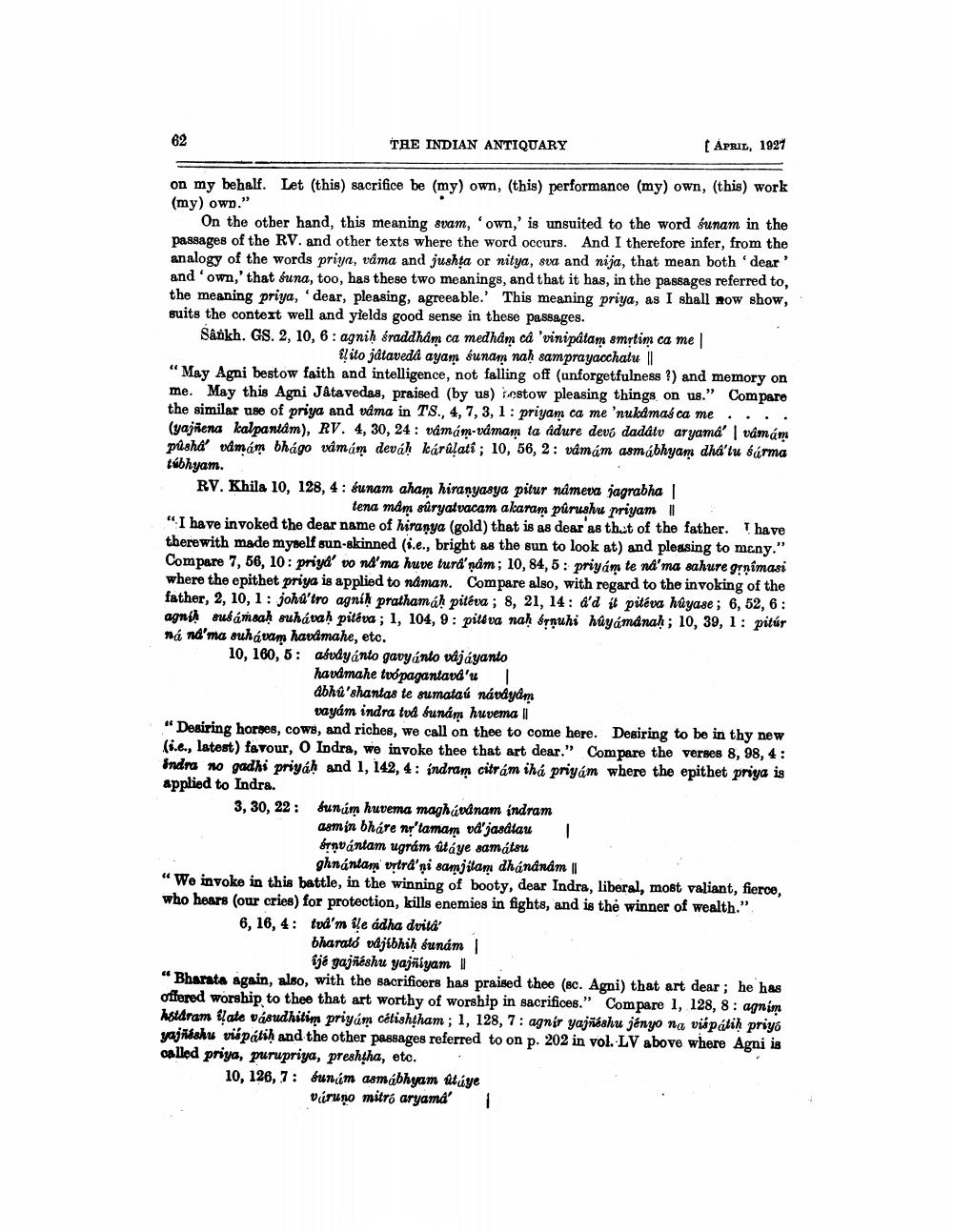________________
THE INDIAN ANTIQUARY
APRIL, 1921
=
on my behalf. Let (this) sacrifice be (my) own, (this) performance (my) own, (this) work (my) own."
On the other hand, this meaning svam, own,' is unsuited to the word sunam in the passages of the RV. and other texts where the word occurs. And I therefore infer, from the analogy of the words priya, váma and jushta or nitya, sva and nija, that mean both 'dear' and own,' that funa, too, has these two meanings, and that it has, in the passages referred to, the meaning priya, 'dear, pleasing, agreeable.' This meaning priya, as I shall now show, suits the context well and yields good sense in these passages. Sankh. GS. 2, 10, 6: agnih sraddhâm ca medham cd 'vinipátam smrtim ca me
llito jätavedå ayam sunam nah samprayacchatu | "May Agni bestow faith and intelligence, not falling off (unforgetfulness ?) and memory on me. May this Agni Jata vedas, praised (by us) Lostow pleasing things on us." Compare the similar use of priya and vama in T'S., 4, 7, 3, 1: priyam ca me 'nukamasca me .... (yajñena kalpantam), RV. 4, 30, 24 : vám ám-vámam la adure devó dadatv aryamá' | vámám půsha vamám bhágo vámám devák kárulati ; 10, 56, 2: vámám asmábhyam dha'tu bárma túbhyam. RV. Khila 10, 128, 4: sunam aham hiranyasya pitur námeva jagrabha
tena mam suryatvacam akaram purushu priyam "I have invoked the dear name of hiranya (gold) that is as dear as that of the father. T have therewith made myself sun-skinned (i.e., bright as the sun to look at) and pleasing to meny." Compare 7, 56, 10: priyd' vo na'ma huve turá' nam; 10, 84,5: priyam te nd'ma sahure grnimasi where the epithet priya is applied to naman. Compare also, with regard to the invoking of the father, 2, 10,1: joha' tro agnih prathamáh piteva ; 8, 21, 14: a'd it pitéva hüyase; 6, 52, 6: agna sušámsah suhávah pitéva; 1, 104, 9: piteva nah bynuhi hûyámánaḥ; 10, 39, 1: pitúr nánd'ma suhávam havdmahe, etc. 10, 160, 5 : afvdyanto gavyánto vajayanto
havámahe tvopagantavd'rt abhu'shantas te sumataí návdyam
vayám indra tvd bunám huvema l "Desiring horses, cows, and riches, we call on thee to come here. Desiring to be in thy new (i.e., latest) favour, O Indra, we invoke thee that art dear." Compare the verses 8, 98, 4: Indra no gadhi priyah and 1, 142, 4: indram citrám ihá priyám where the epithet priya is applied to Indra. 3, 30, 22: bunúm hutema maghuvanam indram
asmin bháre nr'tamam va'jasdlau Snuántam ugrám utáye samálsu
ghnántam vrtra'ni samjitam dhandnam “We invoke in this battle, in the winning of booty, dear Indra, liberal, most valiant, fierce, who hears (our cries) for protection, kills enemies in fights, and is the winner of wealth." 6, 16, 4: tod'm ile ádha dvita'
bharató vájíbhiḥ śunám
ijé gajñéshu yajfiyam || "Bharata again, also, with the sacrificers has praised thee (sc. Agni) that art dear; he has offered worship to thee that art worthy of worship in sacrifices.” Compare 1, 128, 8: agnim hstdram tate vasudhitim priyám cétishtham; 1, 128, 7: agnir yajíóshu jényo na viápátih priyo yajitásku vispatih and the other passages referred to on p. 202 in vol. LV above where Agni is called priya, purupriya, preshtha, etc. 10, 126, 7: bunúm asmábhyam ituye
vúruno mitró aryamd' 1




